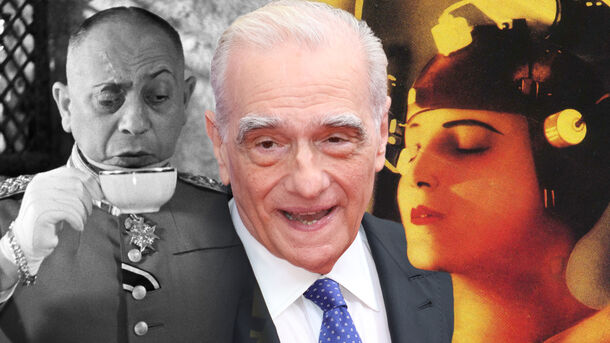10 Foreign Movies You Should Watch to Make Martin Scorsese Respect You

These European and Asian films will put you in the great director's good graces.
A few years ago, Martin Scorsese compiled a list of 39 European and Asian films that he felt all aspiring directors and just movie buffs should watch.
It was inspired by Scorsese's meeting with student Colin Levy, whose five-minute movie impressed the director. Some time after their meeting, Scorsese sent Levy a set of books, DVDs, and the list to help him begin his film studies.
We've chosen the 10 most iconic for starters.
1. The Marriage of Maria Braun
The director Rainer Werner Fassbinder never tried to please the audience – his dark and often even unpleasant films were far from famous and loved in Germany. Abroad, however, he became the most popular and prominent representative of the German New Wave.
The end of the Second World War is approaching, and Maria marries Hermann. It comes out at the wrong time – Berlin is already being bombed, and the newlyweds are signing marriage documents in the ruins of the collapsing city. The next day, Hermann leaves to save a dying Germany. Having lost her last hope for her husband's return, Maria meets an American. And just as she is about to tie her fate to his, Hermann appears.
2. Metropolis
Metropolis is a legend of world cinema and one of the most expensive silent films in history. It is based on a mixture of biblical motifs and reflections on class struggle. If you want to know what gave birth to half of modern science fiction, popular dystopias, cyberpunk and The Matrix, turn to Metropolis.
Metropolis is based on the novel by Thea von Harbou about a city of the future that is strictly divided – workers huddle underground and work themselves to exhaustion, and the privileged elite drink and dance in skyscrapers, having forgotten those of their brothers on whose blood their well-being is based.
3. Nosferatu: A Symphony of Horror
Thomas Hutter, a young real estate agent, travels to distant Transylvania to meet Count Orlok. Later it turns out that the count does not look human at all, but rather like a sinister monster with a hooked nose and protruding ears.
It is Nosferatu by German director Friedrich Wilhelm Murnau that is considered the founder of vampire cinema. The movie laid the visual groundwork for the genre – black cloaks, a nocturnal forest, and a dark Gothic castle.
4. The Grand Illusion
The movie is set during the First World War. A plane of French pilots on a mission has been shot down by a German ace. But according to the German code of honor, a captured enemy is first and foremost an officer, and the German invites the French to dinner.
The director Jean Renoir, who lived through the hell of the First World War, believed that there could be no other war like it. As a humanist, he believed that all men are brothers, separated not by borders and nationalities, which are an illusion, but by class differences.
5. Seven Samurai
The most famous samurai film of all time, and one of only two or three movies about tough men with katanas that can claim the title of true, immortal, genre-free cinema. And simply the best movie by the great Akira Kurosawa.
The story is quite simple, and yet captivating, which is why we have seen variations of it many times: a village suffers from criminals, but cannot defend itself, so it turns to a handful of heroes for help. They should help the peasants to come together and fight off the enemy.
6. Bicycle Thieves
The movie is set in post-war Rome, where many people are literally struggling to survive. Antonio turns out to be one of the lucky few who manages to find a job. But in order to fulfill his new responsibilities, he needs a means of transportation. After selling his wife's dowry, he buys a bicycle, but on his first day of work, becomes the victim of a robber.
Bicycle Thieves is a cult movie by the Italian master Vittorio De Sica. It is an incredibly touching story about despair, love, faith in a better future and the indifference of the world around us.
7. Shoot the Piano Player
This movie focuses on the fate of the pianist Edouard Saroyan. He tries to forget his past, hides under a pseudonym and leads an ordinary life, playing the piano in a small cafe. But everything changes when he falls in love with the waitress Lena and his brother arrives at the cafe, pursued by two gangsters.
By mixing thriller, melodrama, and black comedy in his film, Francois Truffaut made a parody of the gangster films popular in the US in the 1940s, rather than a serious adaptation of a detective story.
8. Band of Outsiders
A crime comedy by Jean-Luc Godard that gave us one of the cult movie scenes – a run through the halls of the Louvre. This is the scene that the characters of Bernardo Bertolucci's The Dreamers tried to recreate. According to the plot, the trio meets at an English course – the two young people convince the girl to become an accomplice in the robbery.
Quentin Tarantino named his own film company A Band Apart after the French name of the movie Bande à part. Godard said it would be better if the creator of Pulp Fiction just gave him money.
9. The Adventure
The daughter of a former diplomat, Anna, goes on a boat trip with friends, but disappears without a trace on one of the islands. The search leads nowhere, and the fiancé of the missing woman becomes close to her best friend.
At the 1960 Cannes Film Festival, Michelangelo Antonioni's film had to compete with such masterpieces as Ingmar Bergman's The Virgin Spring and Luis Bunuel's The Young One. But even so, the film shocked the critics, both for better and for worse.
10. Umberto D.
A cult film directed by Vittorio De Sica, which became a kind of completion of the period of neorealism in Italian cinema.
Almost all the roles in the film are played by non-professional actors, and the plot tells the story of a lonely old man and his dog trying to survive in a cruel and indifferent Rome. The only person who cares about the man is his landlady's pregnant maid, who has begun an unsuccessful affair with a soldier who refuses to acknowledge his paternity.
